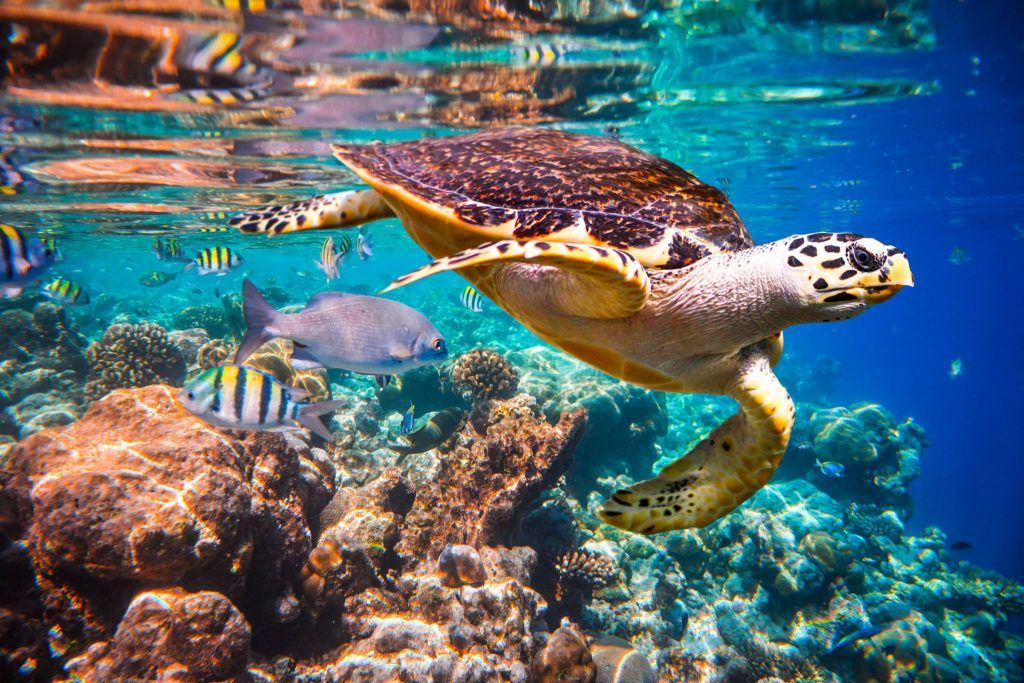UN report: Nature is going downhill. Fast.
By Dawn Stover | May 15, 2019
 Hawksbill turtle floats above an Indian Ocean coral reef in the Maldives. Nearly half of the live coral cover on reefs has been lost in the past 150 years, and coral reefs are particularly vulnerable to climate change. Credit: Andrey Armyagov/Shutterstock
Hawksbill turtle floats above an Indian Ocean coral reef in the Maldives. Nearly half of the live coral cover on reefs has been lost in the past 150 years, and coral reefs are particularly vulnerable to climate change. Credit: Andrey Armyagov/Shutterstock
“Nature is declining globally at rates unprecedented in human history—and the rate of species extinctions is accelerating, with grave impacts on people around the world now likely.” That’s the 10-alarm message from a global assessment report released today by the International Science-Policy Platform on Biodiversity and Ecosystem Services (IPBES), an independent body established by United Nations member states.
While scientists have long been warning that a mass extinction is under way, this is the most comprehensive report on global biodiversity to date, and the first issued since 2005. Among its findings:
- An estimated 1 million of the planet’s 8 million animal and plant species are now threatened with extinction, many within decades.
- The average abundance of native species in most major land-based habitats has fallen by at least 20 percent, mostly since 1900.
- Three-quarters of the planet’s land-based environment and about two-thirds of the marine environment have been significantly altered by human actions.
- Nearly a third of the world’s forest area has been lost since pre-industrial times, and wetlands loss is happening three times faster than forest loss.
- More than a third of the world’s land surface and nearly three-fourths of freshwater resources are now devoted to crop or livestock production.
- Food crop production has tripled since 1970, and 23 percent of land areas have seen a reduction in agricultural productivity due to land degradation.
- One-third of marine fish stocks are being harvested at unsustainable levels.
- In the 21 countries with detailed records, the numbers of invasive alien species per country have risen by about 70 percent since 1970.
- Plastic pollution worldwide has increased tenfold since 1980.
The report’s 145 expert authors from 50 countries ranked the five main reasons for this precipitous decline in nature, in descending order: changes to land and sea use; direct exploitation of organisms; climate change; pollution; and invasive alien species. They warn that global goals for conservation and sustainability can only be achieved by “transformative changes across economic, social, political and technological factors.”
Publication Name: IPBES Global Assessment Report on Biodiversity and Ecosystem Services
To read what we're reading, click here
Together, we make the world safer.
The Bulletin elevates expert voices above the noise. But as an independent nonprofit organization, our operations depend on the support of readers like you. Help us continue to deliver quality journalism that holds leaders accountable. Your support of our work at any level is important. In return, we promise our coverage will be understandable, influential, vigilant, solution-oriented, and fair-minded. Together we can make a difference.
Keywords: IPBES, biodiversity
Topics: Climate Change, What We’re Reading















And the leader of the most powerful nation in the world calls climate change a Chinese hoax. How can humanity move forward under these egregious conditions?